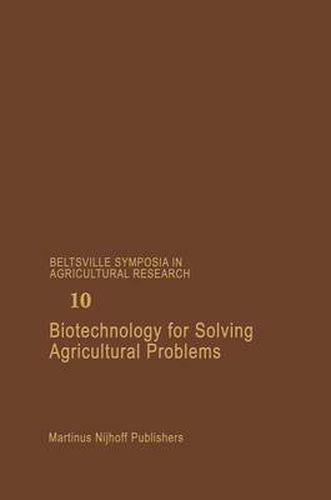Readings Newsletter
Become a Readings Member to make your shopping experience even easier.
Sign in or sign up for free!
You’re not far away from qualifying for FREE standard shipping within Australia
You’ve qualified for FREE standard shipping within Australia
The cart is loading…






This title is printed to order. This book may have been self-published. If so, we cannot guarantee the quality of the content. In the main most books will have gone through the editing process however some may not. We therefore suggest that you be aware of this before ordering this book. If in doubt check either the author or publisher’s details as we are unable to accept any returns unless they are faulty. Please contact us if you have any questions.
The Annual Beltsville Symposium provides a forum for interaction among scientists involved in research that has vital impact on agriculture and on the agricultural sciences. The 10th Symposium in the series, Biotechnology for Solving Agricultural Problems, focuses on the use of a revolutionary new set of tools, biotechnology, and attempts to define the set in terms of its applications in agriculture. Biotechnology has already contributed to the genetic improvement of agricultural products. Procedures that were impossible to test or to implement in the past because of technological limitations are now routinely used by many scientists. Four areas that have benefitted from advances in biotechnology are covered in the symposium proceedings. These areas include genetic manipulation, nutrition, health and disease, and natural resource management. The 31 invited speakers have identified programs of basic and applied research on plants, animals, and insects that fall within these broad areas. Their research strategies included such techniques as germline modification, gene mapping, monoclonal antibody production, and gene transposition. These strategies have tapped new well springs of information and technologies ranging from the regulation of gene expression (and with it, the regulation of development, growth, disease resistance, and nutrient metabolism) to degradation of pesticides and toxic wastes. The applications of biotechnology to agricultural research have opened virgin vistas with enormous potential. The new biotechnological techniques and those that will evolve with their use will contribute markedly to the capacity of the agricultural sciences to advance the well-being of the human race.
$9.00 standard shipping within Australia
FREE standard shipping within Australia for orders over $100.00
Express & International shipping calculated at checkout
This title is printed to order. This book may have been self-published. If so, we cannot guarantee the quality of the content. In the main most books will have gone through the editing process however some may not. We therefore suggest that you be aware of this before ordering this book. If in doubt check either the author or publisher’s details as we are unable to accept any returns unless they are faulty. Please contact us if you have any questions.
The Annual Beltsville Symposium provides a forum for interaction among scientists involved in research that has vital impact on agriculture and on the agricultural sciences. The 10th Symposium in the series, Biotechnology for Solving Agricultural Problems, focuses on the use of a revolutionary new set of tools, biotechnology, and attempts to define the set in terms of its applications in agriculture. Biotechnology has already contributed to the genetic improvement of agricultural products. Procedures that were impossible to test or to implement in the past because of technological limitations are now routinely used by many scientists. Four areas that have benefitted from advances in biotechnology are covered in the symposium proceedings. These areas include genetic manipulation, nutrition, health and disease, and natural resource management. The 31 invited speakers have identified programs of basic and applied research on plants, animals, and insects that fall within these broad areas. Their research strategies included such techniques as germline modification, gene mapping, monoclonal antibody production, and gene transposition. These strategies have tapped new well springs of information and technologies ranging from the regulation of gene expression (and with it, the regulation of development, growth, disease resistance, and nutrient metabolism) to degradation of pesticides and toxic wastes. The applications of biotechnology to agricultural research have opened virgin vistas with enormous potential. The new biotechnological techniques and those that will evolve with their use will contribute markedly to the capacity of the agricultural sciences to advance the well-being of the human race.